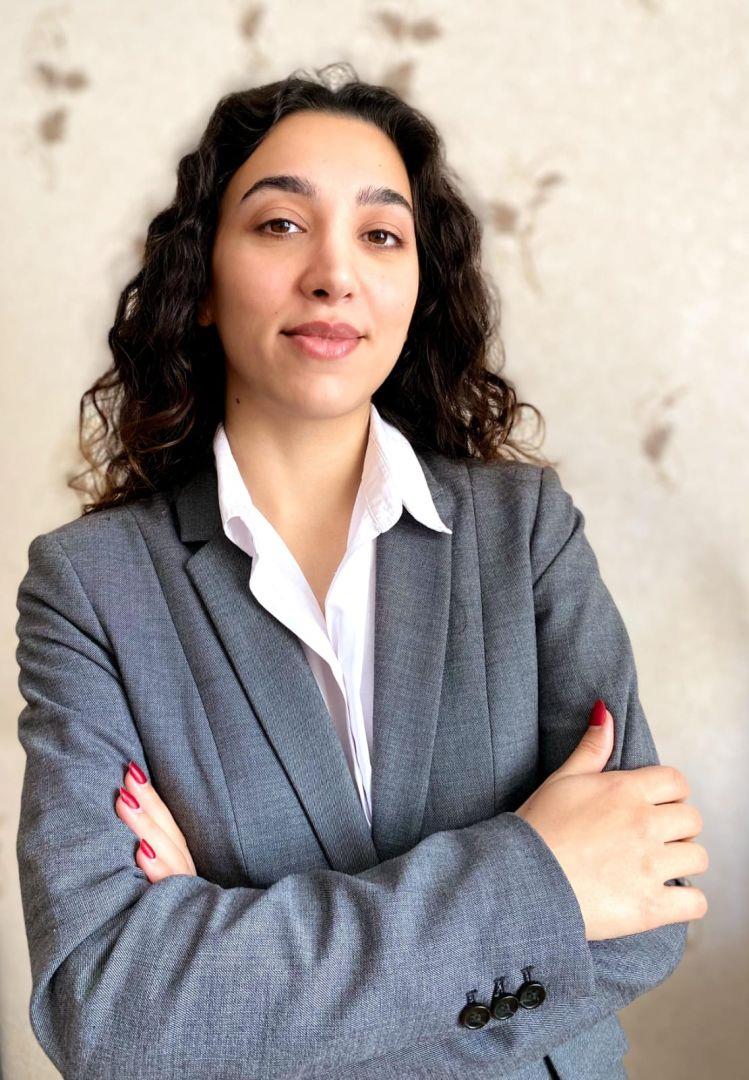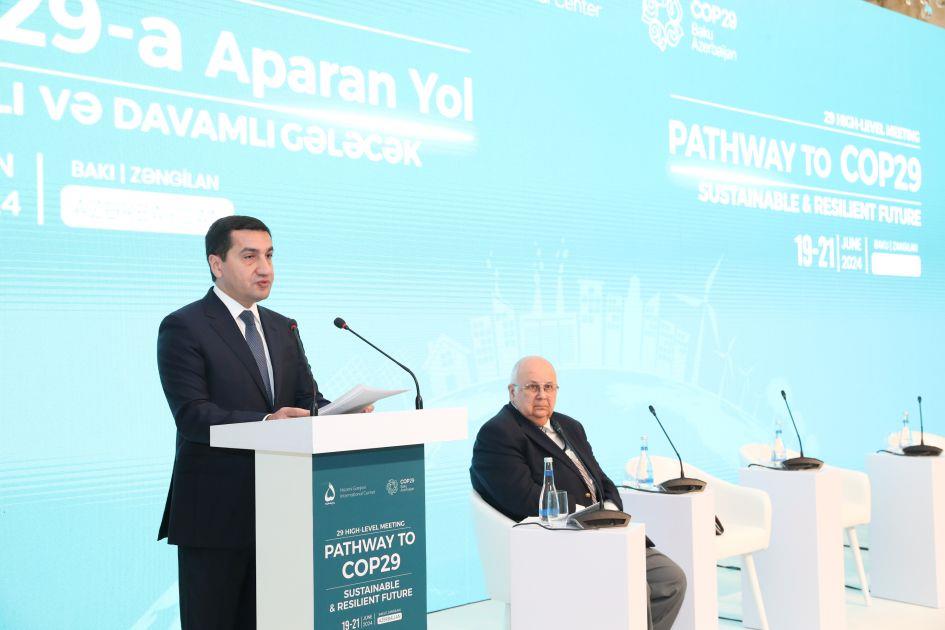
Azerbaijan Leads Global Climate Action At COP29: President's Call For Innovation And Cooperation

Nazrin Abdul Read more
Hosting one of the largest UN events, the 29th session of the Conference of the Parties to the Framework Convention on Climate Change marks a significant achievement for Azerbaijan. This success stands as a cornerstone in Azerbaijan's foreign policy, rivalled only by its leadership in the Non-Aligned Movement and membership in the Security Council.
Azerbaijan has established itself as a dependable energy partner and a responsible global player in combating climate change. Despite its abundant oil and gas reserves, Azerbaijan is committed to a sustainable energy future and a "green economy". The country has long initiated the transition to renewable energy sources. Following the signing of the Paris Agreement, Azerbaijan aims to reduce greenhouse gas emissions by 35% by 2030 and 40% by 2050. The development of renewable energy, therefore, forms a crucial pillar of Azerbaijan's clean energy strategy.
Notably, Azerbaijan plans to commission 9 solar and wind power plants by the end of 2027, generating up to 2 gigawatts of energy. By 2030, an additional 10 plants with a capacity of up to 5 gigawatts will be operational.
In continuation of these efforts, Baku hosted the 29th High-Level Meeting themed "Pathway to COP29: Sustainable and Resilient Future," on June 19, a prelude to Azerbaijan's hosting of COP29. The opening ceremony, held on June 19 and spanning three days until June 21, was inaugurated by Hikmet Hajiyev, Assistant to the President and Head of the Department of Foreign Policy of the Presidential Administration, who read President Ilham Aliyev's address.
"The fight against climate change has long been a pivotal global issue," emphasised President Aliyev's address. He underscored the climate crisis's global nature and its pervasive impact on sustainable development and people's lives.
President Aliyev affirmed Azerbaijan's full preparedness for COP29 and its commitment to fostering collaboration with other nations and stakeholders in combating climate change. He highlighted Azerbaijan's openness to cooperation with NGOs and think tanks, acknowledging their role in sharing expertise and supporting the COP29 preparations.
Regarding international cooperation, Azerbaijan collaborates closely with Turkiye, Saudi Arabia, the UAE, China, Central Asia, and European countries on various joint projects. Notably, Azerbaijan, Turkiye, and Europe are advancing the "Azerbaijan-Turkiye-Europe" green energy corridor, aimed at exporting renewable energy from Azerbaijan's Nakhchivan region to Turkiye and further to Europe.
Additionally, Azerbaijan is actively involved in the "Caspian-Black Sea-Europe Green Energy Corridor" project, known as the "Black Sea Cable", facilitating the transmission of green energy from Azerbaijan's wind farms to Romania and beyond.
Overall, Azerbaijan's strides in sustainable energy and its proactive role in global climate action position it as a key player in shaping a green, equitable, and sustainable future for the planet.
The green energy partnership, initiated in 2020 with Saudi Arabia's ACWA Power and the UAE's Masdar for pilot projects totaling 240 MW of wind and 230 MW of solar, has rapidly expanded in scope. In a short span, collaboration with companies like Masdar, ACWA Power, bp , Fortescue Future Industries, China Gezhouba Group Overseas Investment, Total Energies, Nobel Energy, and A-Z Czech Engineering has surged, resulting in a cumulative capacity exceeding 28 gigawatts. These cooperative efforts underscore international confidence in Azerbaijan's green energy trajectory, championed by its president.
During Baku Energy Week, the State Oil Company of Azerbaijan (SOCAR) and Masdar finalised Shareholder Agreements for three renewable energy ventures: one wind and two solar power projects within Azerbaijan.
Key milestones include the signing of a Memorandum of Understanding between Azerbaijan's State Agency for Renewable Energy and the EU's WindEurope, alongside another MOU between Azerbaijan's Ministry of Energy and EU-based Nobel Energy, marking pivotal moments in forging new energy alliances. These initiatives align with Azerbaijan's strategy, developed jointly with the EU, aimed at integrating green energy into the national grid by 2027.
President Aliyev reiterated Azerbaijan's climate commitments in his address, urging global action against escalating climate threats:
"While significant strides have been made globally to combat global warming, escalating challenges demand urgent international mobilization to limit warming to 1.5°C. We face a critical juncture where the international community must swiftly agree on new collective financial targets beyond 2025 at COP29 in Baku. This underscores our collective responsibility to safeguard our future."
The President also highlighted Azerbaijan's commitment to addressing the unique challenges of small island states, which are disproportionately impacted by climate change. As host of COP29, Azerbaijan pledges to facilitate constructive dialogue and ensure impactful climate action, focusing on mitigation, adaptation, finance, biodiversity, water and food security, agriculture, and the role of science and innovation.
"In assuming the presidency of this esteemed event, Azerbaijan is dedicated to steering COP29 towards successful outcomes through transparent, inclusive negotiations. We look forward to robust discussions at the Nizami Ganjavi International Centre, confident they will drive essential decisions crucial for our planet."
This statement outlines Azerbaijan's proactive role in global climate governance and its steadfast commitment to advancing sustainable solutions on the world stage.
The President of Azerbaijan also highlighted the remarkable achievements of the Nizami Ganjavi International Centre, which organised the event.
"Operating under the guiding principles of the visionary Azerbaijani poet and thinker, Nizami Ganjavi, the Nizami Ganjavi International Centre has swiftly risen to prominence as a leading global institution, earning widespread respect and trust," stated President Ilham Aliyev.
Expressing his appreciation for the centre's initiatives and innovative approaches to tackling contemporary global challenges, the President remarked, "The efforts of the Nizami Ganjavi International Centre are highly esteemed and valued on the international stage."
During the event's opening ceremony, Ismail Serageldin, the moderator and co-chairman of the Nizami Ganjavi International Centre, was honoured with the "honorary diploma of the President of the Republic of Azerbaijan."
In his address, Serageldin reflected on the 30 years since the Kyoto Protocol was first introduced, noting the profound changes since then in the global effort to combat climate change. He underscored the significance of Azerbaijan hosting COP 29 this year, emphasising, "We are actively engaged in discussions with our team. The recent unprecedented heatwaves exceeding 52 degrees Celsius in Pakistan and India underscore the severe challenges posed by global warming and climate change to humanity."
Mukhtar Babayev, the President of COP29 and Azerbaijan's Minister of Ecology and Natural Resources, affirmed Azerbaijan's commitment to ensuring COP29 is conducted inclusively, transparently, and fairly.
"As the COP29 Presidency, it is crucial to listen to all perspectives and foster consensus in addressing climate change," emphasised the Minister.
He further highlighted, "Over the past months, our team has held extensive consultations with leaders of relevant international organisations, creating new opportunities to enhance ambition and action."
The 29th High-Level Meeting, organised in preparation for COP29, aims to address key issues in the fight against climate change. The event is progressing with panel sessions, covering a wide range of topics. Notably, the first day included panels attended by up to 100 guests, focusing on "Overview of the Climate Challenge," "Balancing Mitigation, Adaptation, and Sustainability," and "Climate Change's Impact on Water, Biodiversity, and Food Security."
Participants also engaged in discussions on "The Role of Science, Technology, and Innovation," "Challenges Facing the Food and Agriculture Sector," "Financing Climate Change Responses and Sustainable Development Goals," "One Planet, One Health: Uniting for a Sustainable Future," and Azerbaijan's unique experiences and insights.
Jean-Pierre Cayol, Coordinator of the Department of Nuclear Sciences and Applications at the International Atomic Energy Agency (IAEA), stressed that "advancing innovation will be pivotal in the global efforts to combat climate change."
Appreciating Azerbaijan's commitment, the representative of AEBA emphasised, "Addressing the climate crisis must be the foremost priority for all nations worldwide. Incorporating cutting-edge technologies and innovative ideas is crucial in this endeavour. COP29 presents a significant opportunity for advancing in this direction."
During the panel discussion, Milica Pejanovic-Durišić, former Minister of Defense of Montenegro, asserted, "COP29 should serve as a platform to extensively explore and discuss the intersections of new biology, ICT, and artificial intelligence."
She added, "We are witnessing an era of remarkable scientific, technological, and innovative advancements. The revolutions in new biology, ICT, and artificial intelligence offer unprecedented possibilities. Our primary objective should be to harness these advancements for the benefit of future generations amidst the challenges posed by climate change."
In her contribution to the panel, MP Nigar Arpadarai underscored, "At COP29, our primary focus should be on attracting investments to tackle climate change issues."
Highlighting the escalating financial risks, she stressed, "We need to enhance our universities and support our researchers to drive green innovation. This entails leveraging state-of-the-art technologies and ideas to develop new products and processes that not only spur growth but also foster inclusivity."
Two panel discussions of the event, which conclude on June 21, will take place in Zangilan district.
It's worth highlighting that the success of COP29 will not only reflect Azerbaijan's achievement but also enhance the credibility and integrity of global climate action. COP29 holds the promise of handing down a healthier and more sustainable world to future generations.
Thus, global cooperation is imperative in addressing climate challenges. A successful COP29 can catalyse interest in sustainable solutions through collective efforts, contributing to a better world for generations to come. Addressing climate challenges also presents an opportunity to promote not only environmental health but also economic prosperity and sustainable development.
In conclusion, the decision to entrust Azerbaijan with the responsibility of hosting COP29 underscores the international community's profound confidence in our nation. This trust is rooted in Azerbaijan's extensive experience in hosting numerous international events focused on political, economic, and humanitarian issues.
Legal Disclaimer:
MENAFN provides the
information “as is” without warranty of any kind. We do not accept
any responsibility or liability for the accuracy, content, images,
videos, licenses, completeness, legality, or reliability of the information
contained in this article. If you have any complaints or copyright
issues related to this article, kindly contact the provider above.


















Comments
No comment